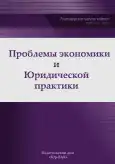Digital Transformation of Industry: Assessing the Maturity of Organizations
- Authors: Dontsova O.I.1, Abdikeev N.M.1, Bekulova S.R.1
-
Affiliations:
- Financial University under the Government of the Russian Federation
- Issue: Vol 18, No 5 (2022)
- Pages: 216-221
- Section: Articles
- URL: https://bakhtiniada.ru/2541-8025/article/view/147366
- ID: 147366
Cite item
Abstract
About the authors
Olesya I. Dontsova
Financial University under the Government of the Russian Federation
Email: oidontsova@fa.ru
Cand. Sci. (Econ.), Associate Professor; Associate Professor of the Academic Department of Economic theory, Leading researcher of the Institute Moscow, Russian Federation
Niyaz M. Abdikeev
Financial University under the Government of the Russian Federation
Email: nabdikeev@fa.ru
Dr. Sci. (Eng.), Professor, Director of the Institute of Financial and Industrial Policy Moscow, Russian Federation
Susanna R. Bekulova
Financial University under the Government of the Russian Federation
Email: srbekulova@fa.ru
Junior Researcher at the Institute of Financial and Industrial Policy Moscow, Russian Federation
References
- Chanias S., Hess T. Understanding Digital Transformation Strategy Formation: Insights from Europe's Automotive Industry. Pacis, 2016. 296 p. URL: https://www.researchgate.net/publication/311443349_Understanding_Digital_Transformation_Strategy_Formation_Insights_from_Europe's_Automotive_Industry (дата обращения: 07.09.2022).
- Chapo D., Kalyazina S.E., Bagaeva I.V., Zotova E.A. Assessing the resilience of industrial enterprises to digital transformation. Global scientific potential = Global'nyj nauchnyj potencial. 2019; 9(102):140-145. (In Russ.).
- B. Wernicke, Stehn L., Sezer A., Thunberg M. Introduction of a digital maturity assessment framework for construction site operations. International Journal of Construction Management. 2021. doi: 10.1080/15623599.2021.1943629
- Teichert R. Digital Transformation Maturity: A Systematic Review of Literature. Acta Universitatis Agriculturae et Silviculturae Mendelianae Brunensis, 2019; 67(6):1673-1687.
- Kirillina Yu.V. Digital transformation and digital maturity of the organization. Actual scientific research in the modern world = Aktual'nye nauchnye issledovaniya v sovremennom mire. 2020; 7(63):72-80. (In Russ.).
- Gileva T.A. Enterprise Digital Maturity: Assessment and Management Methods. Vestnik UGNTU. Science, education, economics. Series: Economy = Vestnik UGNTU. Nauka, obrazovanie, ekonomika. Seriya: Ekonomika. 2019;1(27):38-52. doi: 10.17122/2541-8904-2019-1-27-38-52. (In Russ.).
- Medvedeva L.F., Arkhipova L.I. Digital maturity as a factor of competitive advantage in business. Big Data and Advanced Analytics = Big Data and Advanced Analytics. 2021; 7:86-98. (In Russ.).
- Lahrmann G., Marx F., Winter R., Wortmann F. Business Intelligence Maturity: Development and Evaluation of a Theoretical Model. 2011 44th Hawaii International Conference on System Sciences. Washington: IEEE, 2011: 1-10. doi: 10.1109/HICSS.2011.90.
- Leipzig T., Gamp M., Manz D., Schöttle K., Ohlhausen P., Oosthuizen G., Palm D., Leipzig K. Initialising customer-oriented digital transformation in enterprises. Procedia Manufacturing. 2017, vol. 8, pp. 517-524. doi: 10.1016/j.promfg.2017.02.066.
- Derizemlya V.E., Ter-Grigoryants A.A. Methodological provisions for assessing the digital maturity of economic systems. Bulletin of the Peoples' Friendship University of Russia. Series: Economics = Vestnik Rossijskogo universiteta druzhby narodov. Seriya: Ekonomika. 2021; 1:39-55. doi: 10.22363/2313-2329-2021-29-1-39-55 (In Russ.).
- Ustundag A., Cevikcan E. Industry 4.0: Managing the Digital Transformation, Springer Series in Advanced Manufacturing. Switzerland: Springer International Publishing; 2018. 286 р. doi: 10.1007/978-3-319-57870-5
- Carolis D., Macchi M., Negri E., Terzi S. Guiding manufacturing companies towards digitalization a methodology for supporting manufacturing companies in defining their digitalization roadmap. 2017 International Conference on Engineering, Technology and Innovation (ICE/ITMC). Madeira: IEEE, 2017, pp. 487-495. doi: 10.1109/ICE.2017.8279925.
- Philipp R. Digital readiness index assessment towards smart port development. Sustainability Management Forum. 2020; 28: 49-60. doi: 10.1007/s00550-020-00501-5
- Bannykh G.A. Conceptualization of the digital concept of university maturity in a high degree of digital transformation of higher education. Bulletin of Maikop State Technological University = Vestnik Majkopskogo gosudarstvennogo tekhnologicheskogo universiteta. 2022; 1:110-120. doi: 10.47370/2078-1024-2022-14-1-110-120.
- Popov E.V., Simonova V.L., Cherepanov V.V. Levels of digital maturity of an industrial enterprise. Journal of New Economics = Journal of New Economics. 2021; 2:88-109. doi: 10.29141/2658-5081-2021-22-2-5 (In Russ.).
- Kurlov V.V., Kosukhina M.A., Kurlov A.V. Model for assessing the digital maturity of an industrial enterprise. Economics and Management = Ekonomika i upravlenie. 2022;28(5):439-451. doi: 10.35854/1998-1627-2022-5-439-451(In Russ.)
- Kuzmin P.S. Industrial digitalization: аn empirical assessment of the digital maturity of enterprises. Strategic decisions and risk management = Strategicheskie resheniya i risk-menedzhment. 2021;12(3):220-235. doi: 10.17747/2618-947X-2021-3-220-235 (In Russ.)
Supplementary files








